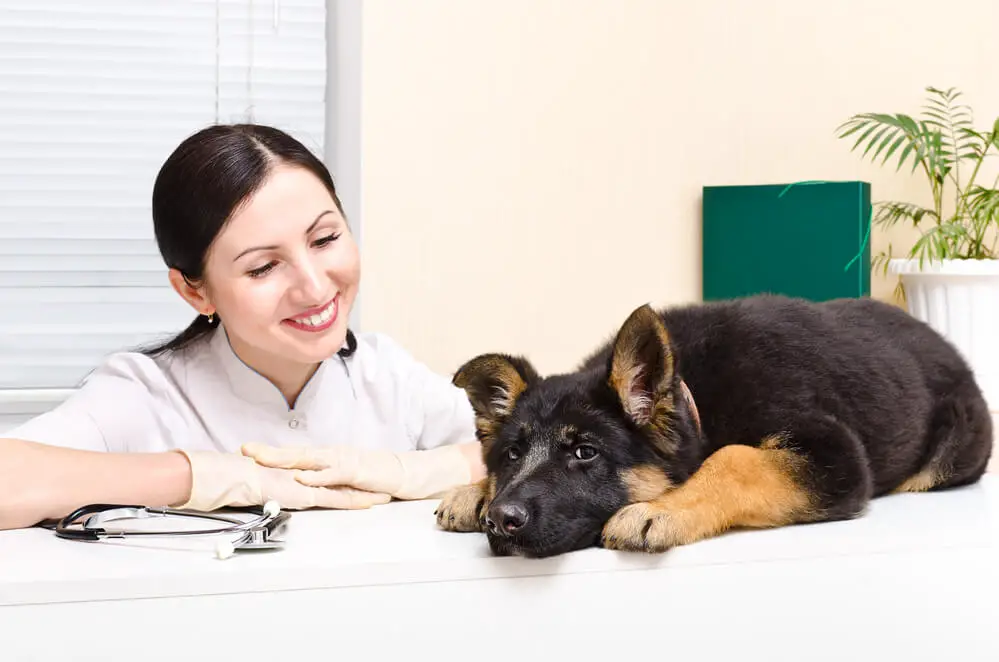Common Reasons for Underweight German Shepherd Puppies

In this section, we will discuss some common reasons why your German Shepherd puppy might be underweight.
These reasons include inadequate nutrition, parasitic infections, and digestive disorders.
Inadequate Nutrition
One of the main reasons for an underweight German Shepherd puppy is inadequate nutrition. Your puppy might not be receiving the proper amount of calories, protein, fat, vitamins, and minerals that they need for healthy growth.
To ensure your puppy is getting the proper nutrients, select a high-quality dog food specifically formulated for German Shepherd puppies.
Remember to consult your veterinarian about the appropriate serving size and feeding schedule for your puppy’s age, size, and activity level.
Parasitic Infections
Another reason for a skinny German Shepherd puppy could be the presence of worms or parasites, such as tapeworms, which live in the dog’s intestines.
These parasites can interfere with your puppy’s ability to absorb nutrients and cause weight loss. If you suspect a parasitic infection, consult with your veterinarian for diagnosis and treatment options.
Digestive Disorders
Lastly, digestive disorders can also be a contributing factor to an underweight German Shepherd puppy.
This can include conditions such as food allergies, inflammatory bowel disease, or malabsorption syndromes, which affect your puppy’s ability to properly digest and absorb nutrients from their food.
If your puppy is experiencing symptoms such as vomiting, diarrhea, or lack of appetite, consult with your veterinarian for a proper diagnosis and treatment plan.
By taking the necessary steps to address these common issues, you can help your German Shepherd puppy achieve a healthy weight and optimal growth.
Assessing Your German Shepherd Puppy’s Weight

To assess your German Shepherd puppy’s weight, it is essential to consider various factors. Knowing the ideal weight for your pup is crucial to maintaining their health and well-being.
First, identify your puppy’s age. German Shepherd puppies grow quickly and have different weight ranges depending on their age.
Referring to a German Shepherd weight chart can show you where your puppy stands in relation to their expected weight for their age and gender.
Next, evaluate your puppy’s body condition. A healthy German Shepherd puppy should have a noticeable waist when viewed from above and a slight tuck of the abdomen when viewed from the side.
The ribs should also be felt easily but not visibly protruding. If your puppy appears to be too skinny, there might be an underlying health issue such as worms or parasites.
Keep track of your puppy’s appetite and eating habits. It is normal for young pups to experience a temporary loss of appetite after vaccinations, which can lead to a skinny appearance. However, this should resolve within a few days.
If your puppy’s appetite does not return to normal or they continue losing weight, consult your veterinarian.
Finally, consider your puppy’s activity level. German Shepherds are known for their intelligence, energy, and task-driven nature.
Ensure your fur baby is getting plenty of exercise, playtime, and mental stimulation to help them build muscle and maintain a healthy weight.
Remember that each German Shepherd puppy is unique, and growth rates may vary. While it is important to monitor your puppy’s weight, do not panic if they don’t fit the average weight for their age exactly.
Always consult your veterinarian for professional advice regarding your puppy’s health and growth.
Consulting a Vet

When dealing with a skinny German Shepherd puppy, it is essential to consult your veterinarian. They possess the knowledge and experience to help you identify the causes and recommend appropriate measures.
One possible reason for your puppy’s skinniness could be a poor diet. An improper balance of nutrients can lead to weight loss in your dog.
Your vet can guide you in selecting a high-quality dog food that meets your puppy’s nutritional requirements.
They may also advise adjusting portion sizes to make sure your German Shepherd puppy gets the necessary calories for healthy growth.
Another potential cause for your puppy’s thinness is intestinal parasites, such as tapeworms. These parasites can rob your dog of essential nutrients and cause weight loss.
A veterinarian can perform tests for parasites and prescribe the proper medication if needed.
Additionally, your dog’s skinniness could be related to metabolic or gastrointestinal disorders. These conditions may hinder your puppy’s ability to absorb nutrients, causing weight loss even if your puppy is eating enough.
Your vet can diagnose these conditions and recommend appropriate treatments like medications or dietary adjustments.
Remember that German Shepherd puppies naturally have a lean build and their bones grow at a different rate than their muscles, so some degree of skinniness is normal and not a cause for concern.
Yet, always rely on your vet’s expertise to determine if your puppy’s skinniness is within a healthy range or if there’s an underlying medical issue that needs attention.
Make sure you follow their advice and keep a close eye on your dog’s development to ensure a happy and healthy growth process.
How to Help Your Skinny German Shepherd Puppy Gain Weight

Balanced Diet Plan
To help your skinny German Shepherd puppy gain weight, ensure they are on a balanced diet. It’s essential to provide your puppy with high-quality, nutrient-rich food containing sufficient calories.
Choose foods with a higher protein and fat content, as it contributes to healthy weight gain. Be consistent and feed measured food portions at the same time every day to regulate their intake.
Additionally, consult your vet to determine the ideal caloric intake for your puppy’s age, size, and activity level.
Regular Exercise
Incorporating regular exercise into your German Shepherd puppy’s routine will help improve their overall health, appetite, and muscle development. Aim for a balance between physical and mental exercises to stimulate both their body and mind.
Some suitable activities include brisk walks, playtime, and obedience training. Remember to adjust the intensity and duration of exercise according to your puppy’s age, energy levels, and physical abilities.
Be cautious not to over-exercise as it could lead to joint issues and other health problems in your German Shepherd.
Timely Vet Check-ups
Scheduling regular veterinarian check-ups is crucial in identifying any underlying medical issues that may be causing your German Shepherd puppy’s weight loss.
Parasites and worms are common causes of sudden weight loss in dogs, so make sure your puppy is up-to-date with deworming and vaccinations. Your vet can recommend any necessary dietary adjustments or supplementation to address nutritional deficiencies.
Regular vet visits will help ensure your puppy’s overall health and well-being, contributing to healthy weight gain and growth.
Conclusion
It’s important to understand that a skinny German Shepherd puppy can be the result of various factors. One possibility is insufficient calories or a low-quality diet.
It’s crucial to ensure your puppy is receiving enough calories and nutrients for their activity level and growth.
Another reason your German Shepherd puppy might be skinny is the presence of worms or parasites. Regular deworming and vet check-ups are essential to maintain your puppy’s health.
It’s also worth noting that puppies can experience a temporary loss of appetite after vaccinations, which might contribute to their thin appearance.
Apart from that, metabolic and gastrointestinal disorders, picky eating, stress, and age can also play a role in your German Shepherd’s weight.
If you suspect any of these factors are affecting your puppy, consult your veterinarian for guidance.
Don’t be too alarmed if your German Shepherd appears skinny, as some puppies naturally have a slim frame. Nevertheless, it’s essential to monitor their weight and overall health throughout their growth.
By being proactive about your puppy’s diet and health, you can ensure they develop optimally and enjoy a happy life.
Frequently Asked Questions
How can I determine if my German Shepherd puppy is underweight?
To determine if your German Shepherd puppy is underweight, you can examine their body condition. They should have a visible waist when looking from above and a clear tuck in the belly when viewed from the side.
Their ribs and spine should not be easily visible through their fur, but you should be able to feel them with a gentle touch. If you are still unsure about their weight, consult with your veterinarian for a proper evaluation.
What is the ideal weight for a female German Shepherd puppy?
The ideal weight for a female German Shepherd puppy depends on their age and size. German Shepherds are a large breed, and their weight can vary greatly.
Generally, at three months old, a female German Shepherd puppy may weigh between 16-22 pounds, and by six months, they could range from 35-55 pounds.
Nonetheless, it’s essential to monitor their growth and ensure they are developing at a healthy rate. Speak with your vet to get specific weight recommendations based on your individual puppy.
What should I feed my German Shepherd puppy to promote healthy weight gain?
To promote healthy weight gain for your German Shepherd puppy, feed them high-quality puppy food specifically designed for large breeds. This puppy food should include the right balance of proteins, carbohydrates, fats, vitamins, and minerals required for proper growth and development.
You may need to adjust the portion sizes based on your puppy’s activity level and metabolism. Consult your vet for personalized feeding guidelines and recommendations.
How can I help my underweight German Shepherd puppy bulk up?
To help your underweight German Shepherd puppy bulk up, you can increase their daily caloric intake by feeding them more frequent, smaller meals throughout the day. Make sure you are still feeding them high-quality puppy food specifically for large breed puppies.
You can also include healthy high-calorie treats or snacks, such as boiled chicken or green beans, to supplement their meals.
Also, provide age-appropriate physical exercise and mental stimulation, which can ultimately aid their overall growth.
Are there supplements to aid weight gain for a German Shepherd puppy?
There are supplements available to aid weight gain for a German Shepherd puppy, but they should only be used under the guidance of your veterinarian.
Supplements such as multivitamins, omega-3 fatty acids, and probiotics can help support your puppy’s overall health but should be given in appropriate amounts and combined with a balanced diet.
Never administer supplements without consulting your vet first, as some may not be suitable for your puppy’s specific needs or conditions.
What factors could lead to a small or skinny German Shepherd puppy?
Several factors could lead to a small or skinny German Shepherd puppy, including insufficient calories, low-quality diet, parasites, metabolic disorders, gastrointestinal disorders, picky eating habits, stress, or even genetics.
If you’re concerned about your puppy’s size or weight, consult your veterinarian to identify the cause and develop an appropriate plan to improve your puppy’s overall health.
















